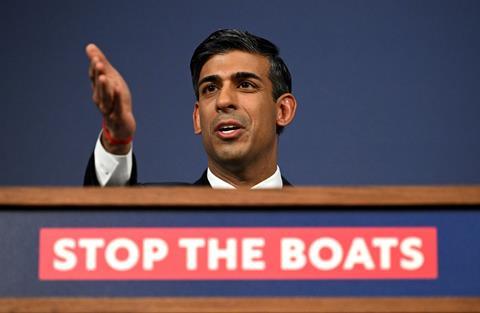'Poor law on Asylum seekers - high on rhetoric – ignoring compelling evidence'
All policy should be informed by a sound evidence base. Political rhetoric and knee jerk responses lead to deficient, poorly targeted, expensive, problematic, and harmful results.


Poor law
The government’s Illegal Migration Bill proposes people entering the UK ‘illegally’ (via small boats) will be removed within 28 days and returned to their home country, or a so-called ‘safe third country’, for example Rwanda or any country where they have previously transited. This is poor law. The Bill assumes the transited country is safe or will take them. This ignores the Refugee Convention from the horror of World War 2, recognising the right of people to flee from a well-founded fear of persecution. The Bill makes this protection meaningless, focussing on method of entry not the cause of flight. In Adimi 1999, Lord Justice Brown ruled there is no lawful way to enter as an asylum seeker. The United Nations High Commissioner for Refugees (UNHCR) expresses deep concerns. This UK Bill is not original. It’s based on failed Australian policy of over a decade. If one looks at independent research this new proposal will be a resounding failure.
Misleading representations to the public
To justify this poor law, the same exaggerated, fear mongering terminology is used by the home secretary as was used in Australia. Australia’s failed policy was implemented years ago. The evidence shows it causes great harm and the ‘duty of care’ is hard to enforce. The slogan ‘stop the boats’ is designed to sound definitive, positive, and achievable. Shamelessly, in Australia, the same language was used to improve polling for upcoming elections in a climate of an electorate worried about refugee arrivals.
Claims the Bill will ‘stop people jumping the queue’ and that there is a ‘safe and legal route’ are built on fiction, misleading and deceptive. There isn’t a ‘queue’ nor any orderly processing of people seeking asylum. The gaps in formal processing and backlogs are why many people languish in detention camps around the world. The UK’s backlog is currently 160,000. This is four times more than France and Germany. More needs to be done to prevent flight and deal with causes. The government glosses over its failure to address this with excuses and a complete failure to understand drivers for people fleeing conflict: desire for safety.

Lack of accountability
This Bill contains minimal if any government accountability. The ‘legal duty’ placed on the home secretary in clause 2 is meaningless as it’s without detailed or enforceable adverse sanction. The exercise of the ‘duty’ cannot be applied in a way that is consistent with the UK's Human Rights Act (HRA) obligations. If the home secretary fails in such a duty, the harm that will be caused to countless vulnerable people including children will be significant and long standing. Contrary to the government’s claims, the statistics tell us most people arriving in this way have valid protection claims. Half come from five countries (including Afghanistan, Eritrea, and Iran) with recognition rates over 80-90%. In Australia, this was the case too. The policy entails detention as does Australia’s. The UK policy will require a huge detention estate expansion from around 3,000 places to over 50,000.
Hard facts - why its poor law
University of New South Wales research concludes Australia’s multi-billion-dollar offshore processing system failed to stop boats, save lives, or break the business model of people smugglers. Contrary to the Australian government's spurious claims, data showed in the first 12 months (of ‘stop the boats’) more people arrived in Australia by boat seeking asylum than at any other time in history or since. Prime minister Rishi Sunak and the home secretary’s claims aren’t borne out by evidence. In Australia the ‘stop the boats’ policy has led to ongoing financial costs for taxpayers (the estimated cost to hold a person offshore is around £2.28 million each year), and violate the fundamental rules of international law, with legal challenges in Australian and international courts. The key concern is the systemic cruelty to children and adults. The policy leads to high rates of self-harm, developmental harm, post-traumatic stress disorder, as well as other mental health problems and its escalation by poor access to adequate or quality health care (UNHCR and Médecins Sans Frontières). This is pertinent as a fifth coming across the channel are children. Behind closed doors, private companies run detention centres (on and offshore) making millions without transparency as to treatment, and demonising health professionals who raised concerns (Save the Children). In Australia, politicians so addicted to the policy, obfuscated, and misread the data for the press. There was cover up due to lack of accountability. Avoiding its duty of care (Australian Human Rights Commission) the government kept changing poor laws, moving the goalposts leading to hopelessness, despair, and destitution.
Esteemed lawyers in the UK assess the Bill and associated policies as unlawful. The government is in denial, pushing on with deficient policy. Like in Australia, harm will be done and with little realisable governmental accountability. Based on Australia’s hard evidence, this policy does significant harm to human beings and fails to deliver the claims of politicians. ‘Stopping the boats’ is a furphy. Nine years on in Australia, people are still waiting for a first interview to explain their asylum claim. Hardly efficient, effective, or fair, and leading to great uncertainty, precarity and insecurity.
Dr Liz Curran is associate professor at Nottingham Law School (NLS), Nottingham Trent University, and Hon. associate professor at Australian National University, College of Law. Dr Helen O’nions is associate professor at NLS































8 Readers' comments